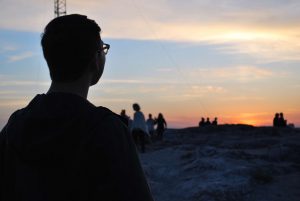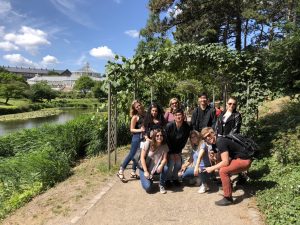Editor’s note: Writer Masaaki Kamiya is a junior from Swansboro, North Carolina, who is double majoring in psychology and Asian studies, with a concentration in Japanese. Masaaki is also a Carolina Social Influencer.
For most of my life, I have always enjoyed traveling. My mother comes from a military family and my dad is from Japan, so it’s safe to say that the travel bug runs in my veins. During my childhood, I had the opportunity to travel from New York to Japan to visit family. Having the opportunity to visit new places drove my desire to study abroad. Before I was accepted into college, I knew that studying abroad was something I wanted to do.
During my second semester of my first year, I discovered that I was eligible to study abroad and immediately began looking into the different programs Carolina had to offer. I knew that I wanted to travel to Europe one day, so I set my sights to the west.
In addition to location, there were lots of little things that I thought about when considering studying abroad. Do I need a visa? Is my passport updated? Will I need to learn a new language? These questions and more were running through my head after I decided to study at the Danish Institute for Study Abroad (better known as DIS) in Stockholm with the UNC psychology department in the summer of 2018.
These questions continue to run through my mind as I prepare to study at Waseda University in Tokyo, Japan, this upcoming March (Japan’s spring semester is from late March to the beginning of August). Because Sweden is very different from Japan, I’ve had to go through some different preparations. Despite the differences, I hope to highlight as much as possible about studying abroad through these five quick tips!

1. Pack a playlist
I listen to a lot of music and podcasts in my free time, so I highly recommend downloading a bunch of music to your phone before beginning to travel. Spotify Premium is discounted for college students, which will allow you to download as much music and podcasts as you want! Download as much as you can, even if you don’t think you’ll listen to it — you’ll be surprised how entertained it’ll keep you from flight to flight.

2. Flying light
When I studied in Stockholm, there were lots of opportunities for me to travel to other countries in Europe because everything is pretty connected and cheap to travel to. I took quite a few flights between countries, and bringing my laptop made going through security a little bit more of a hassle than it needed to be. If you have a laptop sleeve, I recommend you leave it at your dorm or apartment — it’ll save you time! And maybe you’ll impress the airport security agents with how quickly you get through security, like I did.

3. Food vs. fashion
After studying abroad, my friend and I debated which outside-the-classroom experience we enjoyed more: the food you eat or the clothes you can buy. Though we couldn’t come to a consensus, one thing is for sure — take the time to experience both food and fashion. You won’t regret it a bit.

4. Don’t be afraid to ask for help
Though this tip is mostly a no-brainer, it’s essential to add this to the list. There are kind people all over the world, and wherever you go there’s bound to be a shoulder to lean on. Also, definitely reach out to your study abroad adviser! They are a key member on your study abroad team and are literally the nicest, most helpful people I know.
5. Balling on a budget
Budgeting well will save you in the long run, and I did so by outlining how much money I could spend per week based on how much money I had. I always left a little money to spare each week, just in case I wanted to splurge a little. Keeping tabs on your money and looking for deals via websites like Skyscanner can help in the long run.
You can also look into local savings opportunities. For example, when researching budgeting in Japan, I discovered that grocery stores will mark down their food made in-house by 50% the last hour the store is open, which can help you save big! In addition to budgeting, a really helpful app I used for exchange rates is XE Currency Converter. Using this free app, you can download any country’s currency value and quickly calculate the exchange rate!
Bonus tip! Make sure to document your time. It’s not often that you’ll be able to travel, so take pictures, journal and maybe even try out a blog! My friend, Madison Fly, used the One Second a Day app to document her travels. The app automatically compiles the footage for you, as you can see here. Though it does cost a couple dollars, saving your memories is worthwhile.
For anyone considering studying abroad, I recommend checking out UNC’s Study Abroad website and going to talk with an adviser. The office will help you find the perfect program for you!
Safe travels,
Masaaki Kamiya | Class of 2021
Carolina Social Influencer
IG: @masaakikamiya_



